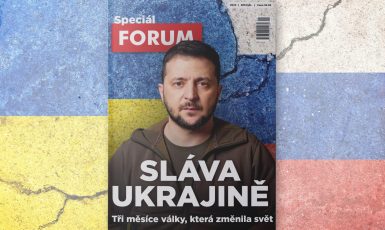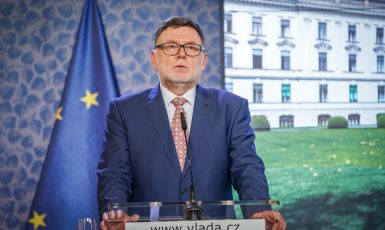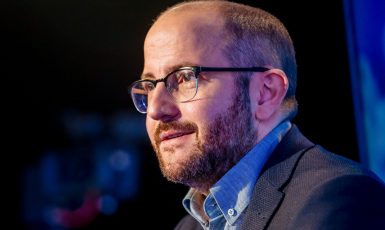Senator Pavel Fischer has worked with Václav Havel for many years, and today he is being talked about as a presidential candidate. Author Alena Ježková conducted an interview with her, which was published in the book Talking to Pavel Fischer, even very personally tuned. For the daily FORUM 24, Fischer spoke not only about Havel, but of course also about the international situation, particularly the conflict in Ukraine.
In a recently published book, you speak openly not only about your career, but also about privacy. One must think that this is the beginning of the presidential election campaign. Is this the correct interpretation?
Read on

There is a Special FORUM about Ukraine. Read all that matters about three months of Putin’s aggression
read article »
Alena Ježková and I have been preparing the book for longer than we expected, about a year and a half. So the release is not targeted at the exact date.
Logically, you talk a lot about Václav Havel, who you have worked with for a long time. Have you thought about what the situation in Ukraine will say, the solidarity of the people, the Purple Government í?
Putting Václav Havel in today’s situation and predicting how he will act is, in my opinion, out of place. Havel is interesting in itself. He had thought extraordinary in his day. He has always reacted sensitively to the great struggle for freedom of speech, freedom of conscience, for the freedom of citizens. And when he thinks of the biggest problems of his time, such as the conflict between Russia and Europe or the looming environmental or financial crisis in the world, it always inspires. That was why they were so attracted to him in the world. He spoke so immortally that he still understands him today. He also spoke of Ukraine as if he foresaw further developments.
When Václav Havel is spoken of, what is the strongest memory of him personally for you?
Vaclav Havel is a great boss. He has a great sense of humour. When it came down to it, he could laugh at himself. He took great care of us, his comrades. When he doesn’t know where to go, he listens to experts for hours before formulating his own opinion. This is one of my strongest experiences. After all, when a man who is willing and able to listen in the highest role in the state demonstrates that he is not only humanly wise, but he has the prerequisites of being a good public administrator. And that’s great news for the whole country. I think it’s clear from a distance what’s so great about him. On the outside, he might seem inconspicuous and uncertain at times, but that’s just appearances. He was as hard as a rock when he found something he knew was wrong. It impressed me.
The Fial government has stated that it wants to return to Havel’s so-called foreign policy. How do you think things are?
Havel’s foreign policy was based on several pillars: building trusting relations with its neighbors, seeking reconciliation and close dialogue with Germany. Contributes to cooperation in Europe and a high level of trust with the US. Report to our allies, such as Taiwan or Israel. Keeping human rights at the top of the agenda and comprehensively supporting the suffering and oppressed. And also not to be afraid to tell Russia and China and others what makes their behavior unacceptable to us. Without Havel’s personal commitments, we would never be a member of NATO, we would have fewer foreign investors to know about and it would take longer to join the EU. So to sum it up, it took him years to get results. And if you ask today about the reign of Petr Fiala, which has only been in power for a few months, then it is clear that we will have to wait for the results. I will give him time. I like the government’s program statement and some of its actions and have my support. However, Havel would certainly be more principled in some ways. He can afford it – he has high credit and is in the presidency, while Petr Fiala in the prime minister’s office is dealing with a slightly different agenda. And next to him is the president, who, as we have seen and seen, disappeared from public space for weeks. Purple Reign is not that easy.
How does the government cooperate with the Senate on foreign policy matters?
Read on

Chief Economist Komerční banka: Significant investigation of the country will help in the fight against rising prices
read article »
In the Senate, we have long dealt not only with energy security, but also with complex relationships with Russia or China. We are working on a very important topic for Belarus or Ukraine. Well, recently I have the impression that the government is finally able to implement what we have often been asking for in the past. Many of the topics that we have raised repeatedly have been brought to light by Russia’s aggression against Ukraine. Therefore, I am pleased that, for example, we can find a way to deal with the government, even on the most sensitive issues, such as the supply of heavy weapons to Ukraine.
We talked about Russia many times. The aggression against Ukraine has been going on for three months now. Are you surprised by the development and courage of the Ukrainian people?
Russia’s military aggression against Ukraine has given an entirely new dimension to the security of the Czech Republic. When I remember how complicated it was just to analyze the Vrbětice case in the Senate and mention that some institutions, such as the President’s office, failed because they did not defend the interests of the Czech Republic, it seems difficult to me. from today’s point of view. And what did I say about Ukraine? They had found themselves in an extreme situation where the very existence of their country was at stake. As a result, they were forced to set their priorities in such a way that they performed very well today. Not only do they know what they are fighting for, they also fight shrewdly, in communication with the rest of the world and with exemplary courage. We have a lot to learn from them.
How would you rate the attitude of the German government during the conflict?
The resolution, which was discussed and approved by Bundestag members on April 24 to help Ukraine, including support for heavy arms supplies, was among the extraordinary, bold and strategic. Germany experienced a large turnover. Laws changed, for example Gerhard Schröder lost the lifetime benefits that the German state guaranteed to his former chancellor, but which he should not have been entitled to after years of collaborating with the criminal regime in Russia. These are big things. What I find insufficient so far is the speed. German Chancellor Scholz appears to have had plenty of time to implement important decisions, such as the supply of heavy weapons to Ukraine. At the same time, it received a very strong mandate from parliament. From a Ukrainian point of view, this doubt is difficult for me to maintain. I have a personal dream: Chancellor Scholz will soon visit Ukraine and bring the first shipment of armored vehicles, which they can easily supply a hundred. I know this is the dream of many of my colleagues in Germany.
In your opinion, is the general Western response sufficient?
It will be important how the Council of Europe and NATO summits go. I am disturbed by the news that Turkey intends to block the accession of Sweden and Finland to NATO. Similarly, Hungary and other countries have blocked new sanctions against Russia. The news that some traders are paying Russia in rubles for oil and gas today, in violation of the sanctions they have agreed to, is also serious for me. This is called collaboration. The conflict in Ukraine has global repercussions, and anyone who gives time or money to Putin’s criminal regime is acting against the security interests of all of Europe. In this regard, parliaments also had to conduct a vigorous and open debate with their Allied counterparts. And because I have been personally involved for several weeks, I know that the EU and NATO can come out of this test stronger.
Where do you see the biggest challenge to the Czech Presidency in the Council of the European Union?
Read on

Czechs view refugees in a positive light, says sociologist Prokop. Maybe that will change in the summer
read article »
Ukraine has become a priority. It will now depend on the outcome of the Heads of Government and EU countries in the Council of Europe. I assume that many of the tasks of our presidency will remain and will be associated with resolving the impact of Russia’s war against Ukraine. The hardest thing is still ahead of us: how to cut off Russian gas and oil as quickly as possible. Otherwise, we will still be stuck in Russia.
There is a war in Europe that was not foreseen. What will make the world different after him?
We know from history that even during the most serious conflicts, something new is always prepared to bring hope and cooperation. I don’t know how long the current war will last. However, the impact on the world food trade is already devastating, as hundreds of millions of people are threatened with starvation on many continents. So when someone on the Security Council again vetoes a resolution on Ukraine, we have to keep that in mind. UN reforms must remove such barriers once and for all. In this case, I wish the world would be different.






